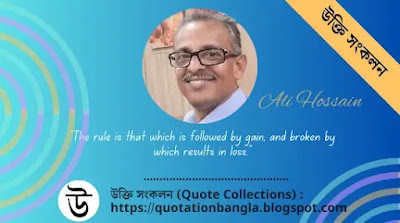Plato's quote about politics
Plato's quote about politics
“One of the penalties of refusing to participate in politics is that you end up being governed by your inferiors.”
— Plato
Read this Quote in BengaliIn Plato's seminal The Republic, he said, “The heaviest penalty for declining to rule is to be ruled by someone inferior” when talking about capable people being disinterested in reforming society. And yet, he argued, they must be the ones to do it.
There are many people in our country who are still averse to politics. They think that politics is a very bad thing and those who think about it are crooks and not good people. Good people never do politics. Many people do not join politics or even vote because of this thought. The number is more or less 30-40 percent.
So it is also expected to question whether being politically aware really affects our lives. A plausible explanation of this philosophical (and political) confusion was given centuries ago by the ancient Greek philosopher Plato.
Greek philosophers wrote about and formulated arguments about politics and governance. Plato wrote in his seminal The Republic,
In the Republic, Plato explains justice, beauty, what the ideal system of government should be, and more through dialogue. He was a student of the philosopher Socrates and in this book he presents his arguments through imaginary conversations between some people including Socrates. Plato made this groundbreaking statement about this explanation.
His argument is that only certain people in a society should do certain things. He criticizes democracy (or the limited version of it that existed in Greece at the time). Plato warned against the power of ordinary people to make decisions and instead said that only trained men known as "philosopher-kings" should be allowed to rule. They should be taught statesmanship and governance and should be honest as well as wise. In one such dialogue, Socrates explains why good people do not want to rule over others.
There are many people in our country who are still averse to politics. They think that politics is a very bad thing and those who think about it are crooks and not good people. Good people never do politics. Many people do not join politics or even vote because of this thought. The number is more or less 30-40 percent.
So it is also expected to question whether being politically aware really affects our lives. A plausible explanation of this philosophical (and political) confusion was given centuries ago by the ancient Greek philosopher Plato.
Greek philosophers wrote about and formulated arguments about politics and governance. Plato wrote in his seminal The Republic,
"The harshest punishment for rejecting politics is to be ruled by an inferior."When the able-bodied were said to be disinterested in social reform, he argued, they must participate in politics.
In the Republic, Plato explains justice, beauty, what the ideal system of government should be, and more through dialogue. He was a student of the philosopher Socrates and in this book he presents his arguments through imaginary conversations between some people including Socrates. Plato made this groundbreaking statement about this explanation.
His argument is that only certain people in a society should do certain things. He criticizes democracy (or the limited version of it that existed in Greece at the time). Plato warned against the power of ordinary people to make decisions and instead said that only trained men known as "philosopher-kings" should be allowed to rule. They should be taught statesmanship and governance and should be honest as well as wise. In one such dialogue, Socrates explains why good people do not want to rule over others.
-------xx------





Comments
Post a Comment